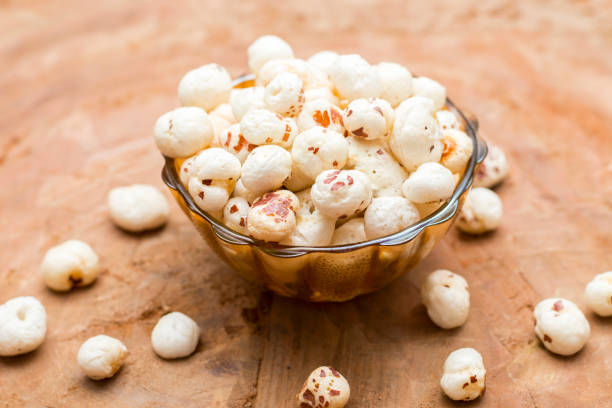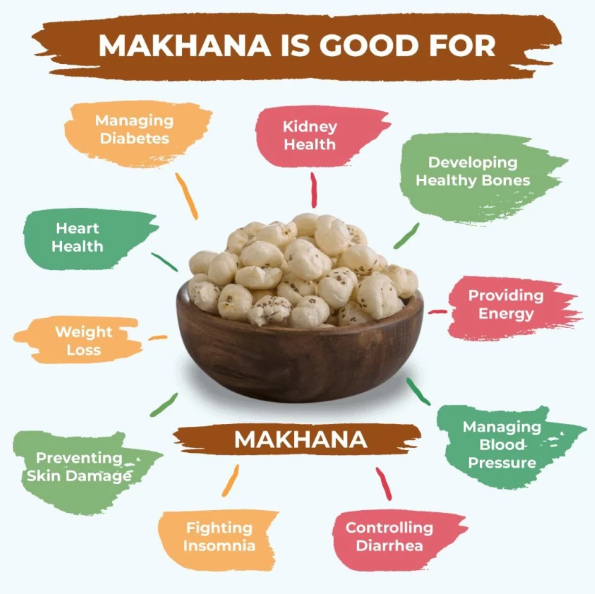Premium Quality Phoxnuts Exporters
At Risom Phoxnuts, we pride ourselves in delivering only the highest quality of phoxnuts, commonly known as Makhane, sourced directly from the heartland of Makhane production—Bihar, India. Specializing in A, B And C grade phoxnuts, we cater to the growing global demand for premium-quality makhane in international markets such as Australia, the United States, Europe, and New Zealand.

Why Choose Our phoXnuts?
- Top-Grade Quality: We meticulously select only A and B grade makhane, which are recognized for their larger size and superior quality. With sizes ranging from 5mm to 25mm, our phoxnuts meet rigorous quality standards to ensure an exceptional product.
- Handpicked from Bihar: Known as the leading region for makhane production, Bihar’s phoxnuts have a rich taste and quality that meet international expectations.
- Direct Export: Our streamlined supply chain allows us to export makhane directly from India to your destination, ensuring freshness and quality in every shipment.
Product Grades
- Grade A Makhane: Our Grade A makhane are of the highest quality, featuring larger sizes and a crunchy texture that makes them ideal for snacking and culinary use.
- Grade B Makhane: Slightly smaller than Grade A, these makhane are still packed with nutrients and flavor, making them a popular choice among health-conscious customers.

Our Commitment to Quality and Sustainability
Our mission is not only to bring quality makhane to global markets but to do so with an emphasis on sustainability and fair trade. We work closely with local farmers in Bihar, supporting their livelihoods and ensuring environmentally friendly farming practices.
-
Environmentally friendly cultivation
Makhana is grown in shallow ponds and wetlands without synthetic fertilizers or pesticides, which cannot harm the ecosystem. The lotus plants that produce makhana absorb excess nutrients from the water, which prevents water pollution. The plants also provide shade for fish and other aquatic life, and their floating leaves create a habitat for a variety of organisms.
-
Carbon-neutral or carbon-negative
Makhana cultivation is carbon-neutral or even carbon-negative because its waterlogged environment slows down the decomposition of organic matter, which reduces greenhouse gas release. Minimal plowing also helps preserve soil carbon content.
-
Sustainable source of income
Makhana cultivation provides a sustainable source of income for local communities.
-
Water-efficient
Makhana seeds don’t require extra water beyond the ponds they’re grown in.
-
Storage solutionsThe Indian government has initiatives to help farmers store makhana safely for over six months, and to build dedicated storage infrastructure.
Global Delivery
From our facility in India to your doorstep, we guarantee prompt and reliable delivery across continents. Whether you’re in the food industry, a distributor, or a direct consumer, we have the infrastructure and expertise to fulfill your orders with consistency and care.

- India is the world’s largest exporter of makhana, with the United States, Canada, and Australia being the top importing countries. Other countries that import makhana include the United Kingdom, the United Arab Emirates, Singapore, Malaysia, Germany, South East Asia, and the European Union.
- Makhana, also known as fox nuts, are high in minerals and vitamins. They are commercially cultivated in Bihar and some parts of eastern India, and are also grown naturally in Madhya Pradesh, Rajasthan, Jammu & Kashmir, Tripura, and Manipur. In China and Japan, makhana paste is used to make pastries and cakes.
